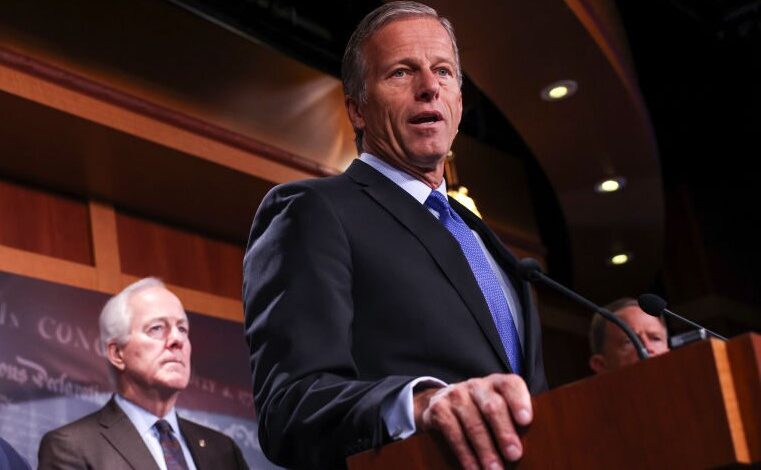Down to Two Johns and Money

Fundraising prowess has emerged as a key factor in choosing the next Senate GOP party leader to succeed current Senate Minority Leader Mitch McConnell (R-Ky.).
McConnell’s announcement that he will be stepping down from the Republican Party’s Senate leadership in November has started a succession bid that will require contenders to showcase their fundraising skills.
McConnell, the longest-serving Senate party leader, has been a major fundraiser for the Republican Party. Since 2015, McConnell has raised more than $1 billion for Republicans through outside groups affiliated with him, and his successor will be expected to maintain that pace once he has stepped down.
While more contenders are rumored to be contemplating jumping into the race, the only two senators who have officially announced their bids are Sen. John Thune (R-S.D.), who has served as the Senate’s Republican whip since 2021, and Sen. John Cornyn (R-Texas), who served as the party’s whip from 2013 to 2019.
Both senators are expected to focus on campaigning to succeed McConnell as GOP Senate leader throughout this election cycle, and are continuing to flex their fundraising acumen.
McConnell has served in the Senate since 1985, making him Kentucky’s longest-serving senator. He has held the position of GOP Senate leader since 2007, having been elected to that role after the 2006 elections. After stepping down, McConnell plans to serve the rest of his term until 2027.
Throughout his career in the Senate, McConnell has raised about $145 million through his campaign committee and leadership PAC, OpenSecrets data shows.
Thune has served in the Senate since 2005 and before was a U.S. Representative for his district in South Dakota from 1997 to 2003. Since the beginning of his career in Congress, Thune has reported raising about $62.5 million.
Cornyn has served in the Senate since 2002 and has raised almost $84 million during that time. The Texas senator has raised more money in less time throughout his career in Congress than Thune, who was first elected to Congress five years earlier than Cornyn.
Despite his shorter tenure in Congress, Cornyn beat Thune in career fundraising by more than $20 million.
While McConnell’s replacement will not be elected until after the general election in November, Senate Republicans are keeping their eyes on these potential candidates to step into McConnell’s role as GOP leader. Senate party leaders are chosen through closed-door meetings and secret ballots after the election, and the Republican Party has not chosen a new party leader since McConnell’s election to leadership in 2007.
McConnell has assisted other Republican candidates and the Republican Party itself with fundraising efforts throughout his time in party leadership. Super PACs linked to McConnell spent millions in battleground states during the 2020 election, as well as dominating spending on political ads during the 2022 midterm election for Republican candidates, outspending even the National Republican Senatorial Committee on ad spending.
During the 2020 election cycle alone, McConnell’s leadership PAC, the Bluegrass Committee, raised $2.2 million, compared to the average Senate members’ leadership PAC fundraising of $410,580.
Thune and Cornyn both have histories of strong fundraising for the Republican Party, but Cornyn has been praised for his fundraising skills during the past few elections. He was one of the top fundraisers last election cycle, beaten only by McConnell himself and Sen. Rick Scott (R-Fla.), whose name has also been floated as a potential contender to replace McConnell
This election cycle, Cornyn has reported transferring $60,000 from his campaign and associated leadership PAC, the R Senate PAC, to the National Republican Senatorial Committee. In 2022, $135,000 was transferred to the NRSC from Cornyn’s campaign and leadership PAC.
Thune’s campaign and associated leadership PAC, the Commonsense Conservative Values Pac, reported transferring $250,000 to the NRSC and $12,000 to 2024 Republican Senate Victory this election cycle.
Both candidates have joint fundraising committees that have given more than $1 million to the NRSC this cycle. The Cornyn Victory Fund has given about $2.5 million to the NRSC thus far this election cycle, while the Thune Victory Fund has given $1.7 million.
However, Cornyn has also given significant amounts from the joint committee, the Cornyn Victory Fund, to other Republican candidates up for reelection.
Twelve incumbent senators are listed as federal beneficiaries of the Cornyn Victory Fund. Sen. John Barrasso (R-Wyo.), who was initially believed to be a contender for McConnell’s replacement but is now running for Republican Whip, was the top recipient of the Cornyn Victory Fund, having received more than $600,000 thus far into the 2024 cycle.




